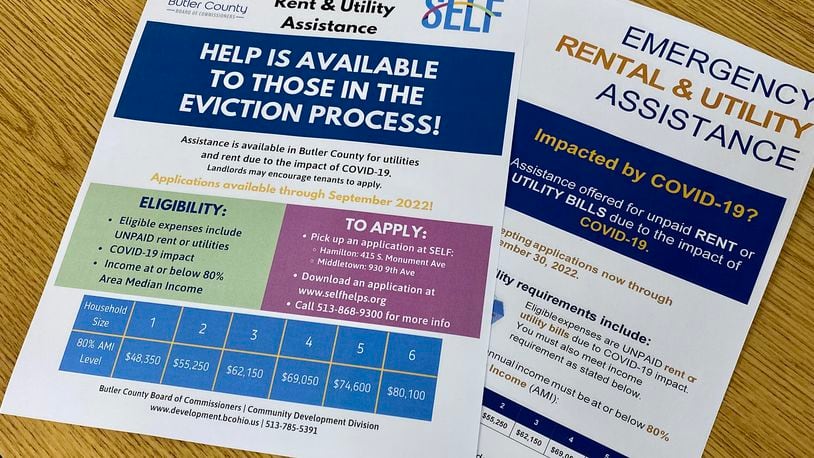The commissioners did not accept the second round of funding initially because they wanted to gauge the need first. They approved collecting it on Thursday at the request of Susan Ellerhorst, the new community development administrator.
“The reason we are asking to apply for additional funding is because over the last four months the program has dispensed over a $1 million each month,” Ellerhorst said. “So by March of ‘22 the $11 million will be expensed.”
The commissioners enlisted the aid of Supports to Encourage Low-income Families in March to manage the program. Executive Director Jeffrey Diver told the Journal-News it has disbursed nearly $8.2 million helping 1,656 households with rent and utilities.
There are restrictions on the money, recipients must be able to demonstrate their inability to pay their rent is due to COVID-19. Eligible renters must make below 80% of the area median income, which equates to earnings of around $45,000 for a family of two.
Jamie Jarrett, a single mother of three from Hamilton who lost her job at the peak of the pandemic, received $2,585 in assistance and she told the commissioners it was a life saver.
“They assisted me with the rent and I was just so appreciative of it,” Jarrett said. “Because I didn’t know any other way to pay those bills without a job and putting my family at top priority. So if it wasn’t for that I’m sure I would be homeless at this time.”
The pandemic shut-down that disrupted many people’s ability to work and pay their bills ended more than a year-and-a-half ago, but Diver said there are still many people struggling. With the omicron variant spreading like wildfire many people are experiencing work interruptions, which impacts their ability to keep up with their bills.
If the current trajectory continues he believes the second pot of money will be used, “the need still appears to be very strong.”
“We are still seeing many households that are experiencing COVID in the household, causing the parents to quarantine and for some of them they’re losing their employment or available income is being cut back due to the quarantine,” Diver said. “We’re still seeing people who got behind a year ago or two years ago that are still behind... then we have individuals who have lost their housing completely.”
SELF can pay up to 15 months of rent and utilities back to late 2020, up to 12 months past due and three months forward.
His agency has also doled out nearly $3.9 million from several other funding sources to 1,197 households, including homeowners — for help with mortgages and property taxes — and renters. The money the commissioners received cannot be used to help homeowners.
Eric Vincent, past president of the Butler County Real Estate Investors Association, said their membership is not seeing as many renters who can’t pay their rent, at least not in the income bracket that are eligible for the assistance.
“I do know of residents out there that make above the $45,000 a year who are really, really hurting and they are way back on their rent with a couple of the housing providers,” Vincent said. “How come they are aren’t helped, because they certainly need it.”
Butler County Development Director David Fehr said the federal rules are very strict.
“That’s not one thing they’re very good at is flexibility,” Fehr said. “There’s not even a waiver or appeal process, they go to the federal registry and say here’s the federal rules. I understand, it’s always tough when you have to draw a line in the sand at a dollar amount.”
When the commissioners approved the first allocation of money they wanted assurance landlords wouldn’t evict the people — the federal government placed an 11-month moratorium on evictions during the height of the crisis — after they got their money or raise rent; they wanted to utilize wrap-around programs the county has to help people get back on their feet, and they wanted to make sure people understood this is short-term assistance.
Jarrett said she has utilized several of the self-help and job ready programs SELF offers. Diver said “we’re following up with every client and trying to get them engaged in services that will help them long-term.”
Commissioner T.C. Rogers has been reticent about accepting the millions of federal dollars the county has received, but told the Journal-News “this is helping the people that are most in need, it turns out it is not something just for landlords, it’s for the people.”
About the Author
